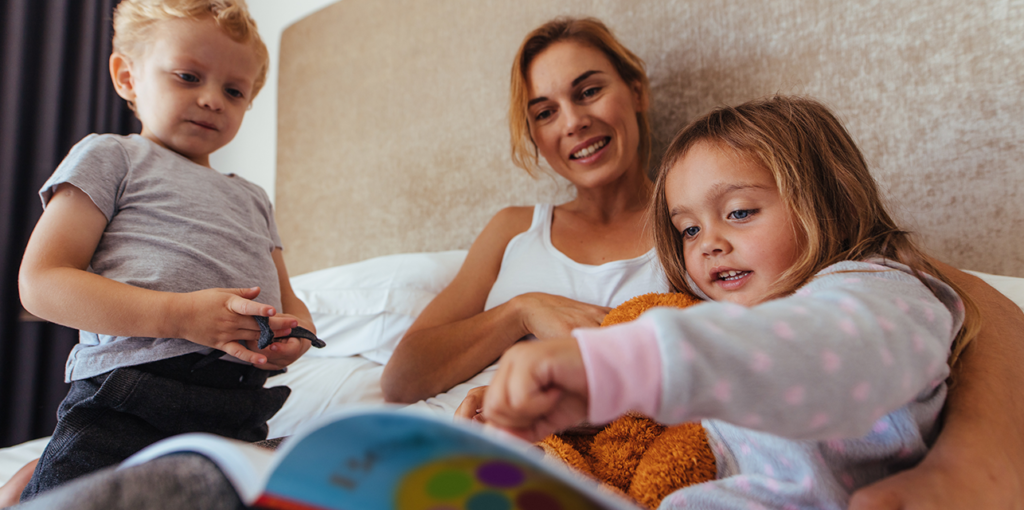
August 12, 2021
Mindful Self-Care: Finding Balance & Well-Being in the Full Catastrophe of Parenthood
The Song and Dance of Parenting
Thinking about the vitally important role of a parent brings to mind a lyric from the popular Foo Fighters’ song, Times Like These: “It’s times like these you give and give again.”
“Mommmmmmyyy,” cried our 3-year old son, “I’m awake!”
I set down my pen and paper and scurried quietly to his room, hoping he wouldn’t wake his baby sister.
“Morning, honey,” I said, with arms outstretched for a hug.
He nuzzled his warm body next to mine, and then made a beeline to the living room. “Mom, where’s my red truck?”
Before I could get in a word, he added, “I’m hungry.”
“How about peanut butter toast?” I prodded.
“Noooo, I want pancakes!”
I contemplated saying, “How about keeping it easy since it’s mommy’s birthday?” But instead I fished out the pancake ingredients.
If you’re a parent, you know this song and dance all too well. Bending over backwards, changing things on the fly, giving…. and giving…. again. It’s simply part of your DNA.
But just because you do it instinctually – and incessantly – doesn’t mean you sit around all day waiting to drop everything and wait on your children. After all, you have needs, too! And sometimes the very things you want – and need – clash with your child’s.
For example, have you ever needed a few minutes to collect your thoughts when your children need rough and rowdy play? How about a few uninterrupted minutes to return an important phone call when your children are clingy and need to connect?
Prioritizing Self-Care & Stress Management

In their popular parenting book, Everyday Blessings, Myla and Jon Kabat-Zinn write, “These needs, all valid and important, are simply different, and are often in conflict. The clash of needs in any given moment may result in a struggle of wills over who is going to get ‘their way,’ especially if we, the parent, are feeling stressed, overburdened, and exhausted.”
That last point really hit home with me. If you think back to the last time you were noticeably stressed or tired, what happened?
Were you:
- More or less apt to argue with your child over silly things like putting toys away or taking a shower?
- More or less tolerant of mess, noise, and kid chaos?
- More or less logical – and loving – toward whiny outbursts and challenging behavior?
On the one hand, stress and exhaustion are part and parcel to the experience of raising children in a pressure-filled, modern world.
On the other hand, if heightened stress further complicates the experience of parenting, wouldn’t it be helpful to consciously address stress and fatigue before they get the best of you?
Parenting educator, Dr. Laura Markham, has said that the #1 responsibility of a parent is to manage their own well-being, simply because it directly effects your child’s well-being, including how connected they feel to you.
When you yourself are balanced, continuously giving your time, energy, and attention is perceived as less taxing and threatening. You’re also less likely to spinout in guilt about taking time for yourself because you see self-care as something that benefits you and your children.
Parenting Guilt & Gratitude
I hear a lot of parents – mothers and fathers alike – talk about the endless guilt of not doing – or being – enough for their children.
While guilt is a normal, healthy response to a behavior that doesn’t sit well with you, if guilt is left to its own devices, it can trap you into thinking you’ve messed up – when you really haven’t. Or, you haven’t done enough – when you really have.
As I see it, a guilt trip is different from a guilt trap. In a guilt trip, you might feel guilty about leaving your children with a babysitter to go to a yoga class, but you don’t let the guilt trap you, or hold you back, from doing what you want to do.
One way to not let guilt trap you is to consciously notice everything you already do for your children. For example, even though you’ve been busier than normal at work, you’re still present and engaged at dinner and bedtime. You make meals they mostly eat, you read books, and whisper, “Sweet dreams,” before turning off the light.
I try to remember what Allison Gopnick said, “We love our children because we care for them.”
Seeing how love blossoms with each caring action, and how love is the basis for children’s worth and well-being means that everything you do matters. (That includes things you do for yourself because, remember, your needs are interdependent.) Your task, then, is simply to see – and appreciate – all the ways in which you give and give again. Letting gratitude comfort your weary, sometimes guilt-filled mind, and inspire you on a path to greater well-being.
Written By Breon Michel